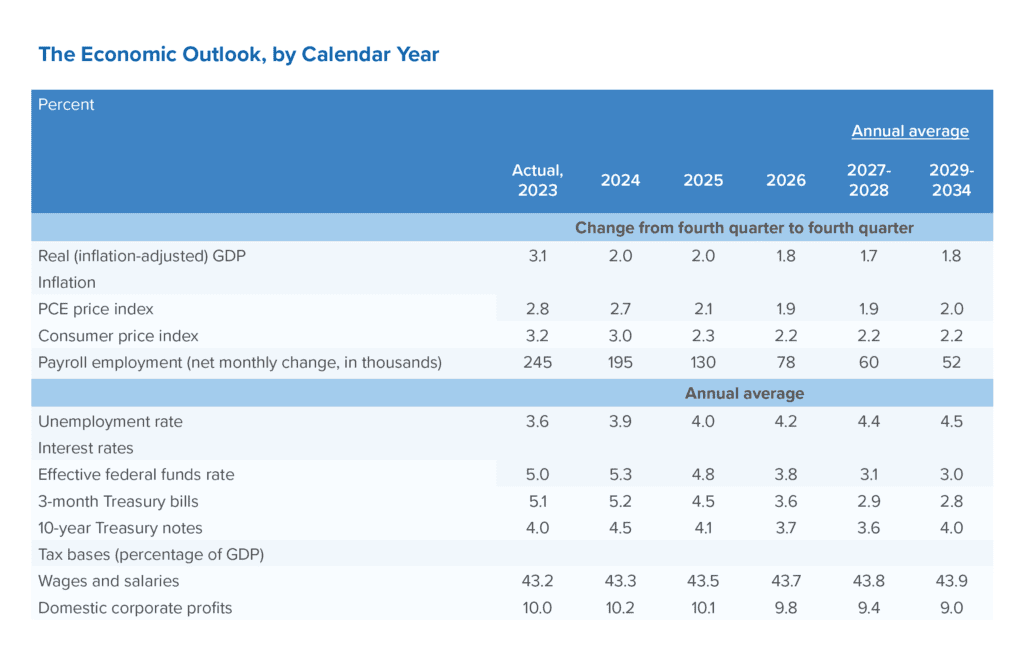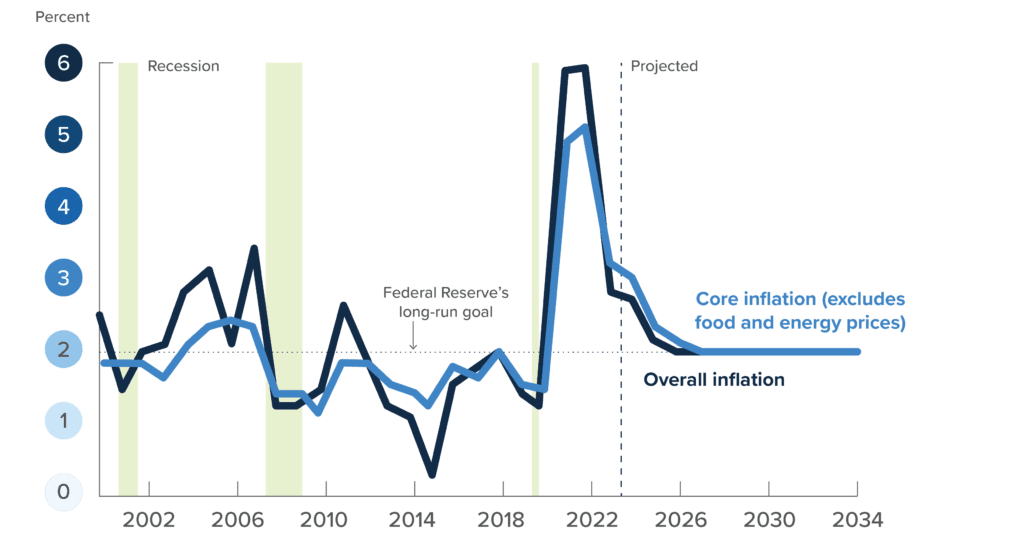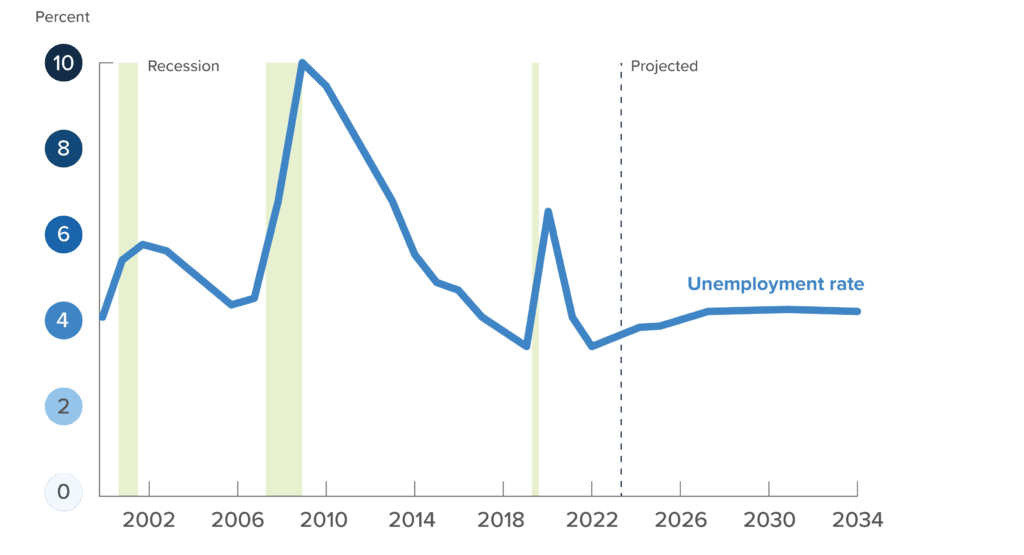
According to a recent Forbes article, many investors and analysts are speculating that the plunge in the stock market in August 2024 indicates a recession is coming. This leaves business owners wondering, “How do I prepare my business for success during a recession?”
This blog post covers all you need to know about the current economic outlook and how digital marketing during a recession may be the answer you’re looking for. During the Great Recession, many businesses adapted their marketing strategies to survive and even thrive. Let’s take a look at how digital marketing can help your business navigate economic downturns.
Introduction to Marketing During a Recession
Marketing during a recession calls for a thoughtful and strategic approach to ensure your business not only weathers the storm but also positions itself for future growth. Economic downturns can be daunting, but they also present unique opportunities for businesses willing to adapt and innovate. By prioritizing digital marketing and crafting a resilient marketing strategy, you can help your business survive—and even thrive—despite challenging conditions.
A well-structured marketing plan is essential during a recession. It allows you to make the most of your marketing budget, focus on your target audience, and identify the most effective tactics for business growth. Rather than pulling back, businesses that continue to invest in marketing during a recession often emerge stronger, with increased brand awareness and customer loyalty. By understanding the market landscape and being proactive, you can turn economic uncertainty into a catalyst for long-term success.
2024 Economic Realities: What You Need to Know
It’s vital to understand these two realities when it comes to predicting economic changes (as an economic layman).
- The economy is complex, based on human decisions, and subject to frequent unpredictable change.
- Most articles covering the economy are designed to draw attention and keep you reading (and, therefore, may come off as alarmist).

It’s hard to determine exactly what will happen to the economy and when. However, as a business owner, executive, hiring manager, or person in business, you need to make decisions based on the economy and economic projections. Here are some general tips for determining economic outlook as accurately as possible:
- Majority Rules: If the majority of economists and economic thought centers are calling for the same economic output, they’re probably right. (Though there are exceptions…sorry.)
- Generalize: Even your go-to economist will be wrong or slightly off sometimes. Generalize predictions and don’t bet on exact projections.
- Take the Middle Road: Obviously, in business, it’s tough to prepare for a downturn and stop investing in new opportunities while still growing your business. Taking the middle road can help you continue scaling and maintaining a mindful economic outlook.
During economic growth periods, business strategies and marketing approaches often focus on expansion and customer acquisition, while in recession periods, the emphasis shifts toward efficiency and customer retention.
With this in mind, let’s get on to our economic predictions for 2024 and beyond.
2024 Economic Predictions
U.S. economists disagree upon whether the United States will defy the looming recession in 2024. The past three years have brought forecasts of recessions, yet the U.S. economy has remained steadfast and defied the odds. Will this trend continue?
Some recent indicators of a looming economic downturn include the unemployment rate climbing to 4.3% which is the highest it has been since October 2021. Additionally, in July, 114,000 workers were hired by employers, falling short of expectations of 185,000 workers.
The economists at Goldman Sachs raised their probability rate of a U.S. recession in the coming year from 15% to 25%.
There’s little question that we’re likely headed toward a slump, but this slump has been predicted and can remain manageable throughout 2024 and 2025.
Understanding the Market and Target Audience
To succeed with marketing in a recession, it’s crucial to understand how your market and target audience are evolving. Economic downturns often lead to significant shifts in consumer behavior, as people become more selective with their spending and prioritize value. Businesses must stay attuned to these changes to remain relevant and competitive.
Conducting thorough market research helps you identify new customer segments and understand changing consumer priorities. By analyzing data from digital marketing channels—such as social media and search engines—you can gain valuable insights into what your target audience needs and values, even during a recession. This enables you to tailor your marketing campaigns and messaging to address their specific pain points and preferences.
Leveraging digital marketing allows you to reach your audience where they are most active, ensuring your value proposition resonates and stands out. By staying connected to your customers and adapting your marketing strategy to their evolving needs, you can maintain engagement and drive results, even in uncertain times.
Market Research and Analysis
A recession-proof marketing strategy starts with robust market research and analysis. Understanding the latest market trends, consumer spending habits, and competitor moves is essential for making informed, data-driven decisions about your marketing budget and tactics. By closely monitoring these factors, you can identify areas of opportunity and adjust your marketing efforts to maximize impact.
Market research enables you to pinpoint new customer segments and develop targeted marketing campaigns that address their unique needs. Analyzing consumer behavior helps you refine your content marketing and digital strategies, ensuring your messaging is relevant and compelling. Taking a data-driven approach not only helps you optimize your marketing spend but also allows you to measure the effectiveness of your campaigns and pivot quickly when needed.
Even during a recession, businesses that invest in market research and analysis are better equipped to adapt their marketing strategies, reach new audiences, and drive business growth. By staying informed and agile, you can make the most of every marketing dollar and position your business for long-term success.
Common Effects of a Recession


A recession can have a significant impact on both businesses and consumers. Here are a few ways that a recession can affect every aspect of the pipeline:
- Businesses: During a recession, businesses may experience a decline in sales, reduced profitability, and difficulty accessing capital. This can lead to reduced hiring, layoffs, and even bankruptcy for some businesses. The uncertainty and unpredictability of a recession can make it difficult for businesses to plan for the future and invest in growth.
- Consumers: During a recession, consumers may experience job losses, reduced income, and financial stress. This can lead to reduced spending, delayed purchases, and increased debt. Consumers may also become more price-sensitive and selective about the product or service they purchase, focusing on value. Many consumers look for ways to save money by seeking discounts, using coupons, or switching to more affordable options.
- Overall economy: A recession can lead to a decline in overall economic activity, including decreased consumer spending, reduced investment, and lower economic growth. This can lead to a ripple effect throughout the economy, impacting multiple industries and sectors.
- Government policies: During a recession, governments may implement policies to stimulate economic activity and support businesses and consumers. These policies may include tax incentives, financial assistance, and infrastructure spending.
While a recession can be a challenging time for businesses, it’s important to remember that it doesn’t necessarily mean that all businesses will fail or experience significant losses. Instead, businesses may need to adjust their strategies and operations to adapt to the changing economic conditions. Small business owners, in particular, may need to adapt quickly to these changing consumer behaviors to remain competitive.
Keep in mind that a recession can be a time of opportunity, and some businesses actually thrive in times of recession. For example, thrift stores historically do very well during economic downturns. Any marketing agency that services these stores will also see growth.
Unexpected Opportunities Arise During a Recession
Here are a few reasons why businesses shouldn’t be too worried during a recession:
- Opportunity for innovation: During a recession, businesses may be forced to innovate and find new ways to reach customers and reduce costs. This can lead to the development of new products or services or the implementation of more efficient processes that can benefit the business in the long run.
- Increased demand for certain products or services: While some businesses may experience a decline in sales during a recession, others may see an increase in demand for their products or services. For example, businesses that offer affordable or necessary products may see an uptick in sales during tough economic times.
- Ability to build resilience: Surviving a recession can make a business more resilient in the long run. By implementing cost-saving measures and diversifying revenue streams, businesses can be better prepared for future economic downturns.
- Government support: Governments may implement policies to support businesses during a recession, such as financial assistance or tax incentives. This can help businesses stay afloat and maintain operations during tough economic times.
It’s vital to take a holistic look at your business models when prepping for a recession. Make informed decisions instead of fear-based decisions. Successful businesses often use recessions as an opportunity for brand building, which helps maintain customer relationships and positions them for a stronger recovery when the economy improves.
Building a Resilient Marketing Plan
A resilient marketing plan is your best defense against the uncertainties of a recession. By focusing on long-term growth and adaptability, you can develop marketing strategies that withstand economic challenges and keep your business moving forward. Incorporating a mix of digital marketing channels—such as social media, email marketing, and search engine optimization—ensures you reach your audience across multiple touchpoints.
Prioritizing customer retention is especially important during a downturn, as retaining existing customers is often more cost-effective than acquiring new ones. Engaging content, strong brand messaging, and targeted paid advertising can help you maintain a loyal customer base and attract new customers, even when budgets are tight.
A well-rounded marketing plan should also include strategies for maintaining and growing your market share. By leveraging digital marketing, you can stay visible, relevant, and top-of-mind for your target audience. Ultimately, a resilient marketing plan helps your business retain customers, drive business growth, and ensure survival—even during a recession.
Digital Marketing vs. Traditional Marketing
While digital marketing may not be completely recession-proof, it is much more resilient than traditional marketing methods during economic downturns. Unlike traditional advertising, which lacks precise measurement and real-time data, digital marketing allows for accurate tracking and immediate adjustments, making it more cost-effective and easier to evaluate. Here are a few reasons why you should continue your digital marketing efforts instead of traditional marketing:
During challenging times, digital marketers play a crucial role in adapting strategies and maximizing results by leveraging the flexibility and data-driven nature of digital channels.
Lower Costs
Digital marketing methods such as social media, email marketing, and search engine optimization (SEO) can be less expensive than traditional marketing methods such as TV, print, and radio advertising. This can make it more accessible and cost-effective for businesses during difficult economic times.
Additionally, digital marketing allows businesses to lower customer acquisition costs by targeting the right audience more efficiently.
Targeted Marketing
Digital marketing methods allow for highly targeted marketing campaigns, which can help businesses reach the right audience with a more personalized message. This can increase the effectiveness of marketing campaigns and help businesses maximize their return on investment.
Measurable Results
Digital marketing methods allow businesses to track and measure the effectiveness of their marketing campaigns in real-time. This can help businesses adjust their strategies and allocate their resources more efficiently to maximize their results.
Additionally, businesses can track their rankings on search engine results pages to measure the effectiveness of their SEO efforts.
Flexibility
Digital marketing methods are highly adaptable and can be adjusted quickly to meet changing market conditions and customer needs. This can help businesses stay competitive and responsive during economic downturns. Not cutting digital marketing during times of high inflation will help businesses stay ahead of their competitors.
Increased Online Activity
During economic downturns, more people may turn to online shopping and digital channels to stay informed and entertained. This can increase the reach and effectiveness of digital marketing campaigns. Increased online activity can also boost organic traffic, helping businesses reach more potential customers without ongoing ad spend.
Overall, digital marketing is not fully immune to the effects of a recession, but it can be more resilient than traditional marketing methods due to its lower costs, targeted marketing capabilities, measurable results, flexibility, and increased online activity.
Drawbacks of Cutting Marketing Spend During a Recession
While cutting marketing budgets might initially seem like a logical way to reduce expenses during a recession, many businesses are tempted to slash marketing budgets to save money. However, this approach can be counterproductive and harm your long-term growth. In fact, investing more money in the right marketing channels during tough times can actually yield better long-term results. Here are a few reasons why you shouldn’t cut your digital marketing budget during poor economic conditions:
Reduced Visibility
Cutting marketing costs during a recession can lead to reduced visibility for the business, making it harder for potential customers to find and engage with the brand. This can lead to a decline in sales and revenue, which can make recovering from a recession even more difficult in the long term.
Missed Opportunities
During a recession, there may be opportunities for businesses to gain market share or enter new markets, but they may miss out on these opportunities if they cut their marketing budget. Investing in marketing during a recession can help businesses take advantage of these opportunities competitors may miss and position themselves for growth in the future.
Reduced Customer Loyalty
Cutting marketing costs during a recession can send a message to existing customers that the business is struggling or may not be around for much longer. This can reduce customer loyalty and trust in the brand, which can be difficult to regain in the future. Maintaining your marketing efforts helps keep loyal customers engaged and prevents them from switching to competitors. It’s worth it to keep your customers’ trust by continuing to market your business.
Increased Competition
During a recession, there may be increased competition for customers and market share. Cutting marketing costs can make it harder for businesses to compete effectively and gain the attention of potential customers. Don’t let your competitors steal your customers by continuing your digital marketing efforts.
Marketing During a Recession: 5 Most Effective Digital Marketing Channels
During a recession, businesses need to focus on cost-effective strategies to promote their products or services. Digital marketing methods are an excellent way to reach a wider audience without breaking the bank. To maximize impact, businesses should carefully evaluate and select the right marketing tactics that align with their goals and budget constraints. Allocating the marketing budget strategically to the most effective digital channels ensures better ROI and resource optimization. Additionally, optimizing marketing operations helps businesses stay agile and efficient when implementing these digital marketing channels.
Here are five top forms of digital marketing for businesses to rely on during an economic downturn.
Marketing During a Recession: 5 Most Effective Digital Marketing Channels
During a recession, businesses need to focus on cost-effective strategies to promote their products or services. Digital marketing methods are an excellent way to reach a wider audience without breaking the bank. To maximize impact, businesses should carefully evaluate and select the right marketing tactics that align with their goals and budget constraints. Allocating the marketing budget strategically to the most effective digital channels ensures better ROI and resource optimization. Additionally, optimizing marketing operations helps businesses stay agile and efficient when implementing these digital marketing channels.
Here are five top forms of digital marketing for businesses to rely on during an economic downturn.

Content Marketing
Content marketing involves creating and sharing valuable content to attract and engage your target audience. This can include blog posts, case studies, whitepapers, videos, infographics, and more. During a recession, people are more likely to do heavy research before making a purchase. Therefore, providing high-quality, informative content can help build trust with potential customers and increase sales.

Search Engine Optimization (SEO)
SEO is the process of optimizing your website to improve its visibility and ranking on search engines like Google. It involves various techniques such as keyword research, link building, and on-page optimization. During a recession, businesses need to ensure that they are ranking well on search engines to attract potential customers who are actively looking for their products or services.
Unlike paid advertising, SEO can deliver long-term results without the need for ongoing ad spend, making it a cost-effective strategy during economic downturns.

Paid Media
Paid media refers to online advertising, including pay-per-click (PPC) ads, social media ads, and display ads. Paid media can be an effective way to reach a larger audience quickly. During a recession, businesses need to be strategic with their ad spend to ensure they are getting the most out of their budget.

Email Marketing
Email marketing involves sending promotional messages and newsletters to a list of subscribers. It is a cost-effective way to nurture leads and build relationships with customers. During a recession, email marketing can be particularly effective as it allows businesses to communicate directly with their customers and offer discounts or promotions to encourage sales.

Social Media
Social media platforms like Facebook, Twitter, and Instagram can be excellent avenues for reaching a wider audience and building brand awareness. During a recession, businesses need to be active on social media to engage with customers and promote their products or services. Social media also allows businesses to listen to customer feedback and respond promptly, which can help build customer trust and loyalty.
Adjust Your Digital Marketing Strategy for Greater Success
As you now know, digital marketing is essential during a recession because it helps businesses harness the power of brand awareness and customer loyalty. Retaining customers through consistent engagement and delivering value is crucial for maintaining sales and staying competitive. A good marketing strategy during a recession focuses on cost-effective, high-impact tactics such as social media marketing and online content to maximize results. Make sure your marketing efforts are aligned with your business goals to avoid wasted resources and improve outcomes. While short term tactics can provide immediate results, it’s important to balance them with long-term brand building for sustainable growth. Even if consumers aren’t spending as much, you don’t want to fall off the map. Social media marketing is a key channel for maintaining engagement and visibility during challenging times. Once economic conditions improve, you’ll be glad you kept up your digital marketing campaigns.
If you are looking for help with a recession marketing strategy, Elevato is here to assist. We create comprehensive digital marketing strategies for businesses to boost online visibility and drive leads. Check our extensive services to see how we can help grow your business, even during a recession! Schedule your free consultation today to discuss how Elevato can help you reach your marketing goals and drive customer engagement.
Conclusion
In summary, marketing during a recession requires a strategic, data-driven approach that leverages the power of digital marketing, thorough market research, and a resilient marketing plan. By understanding your market and target audience, conducting ongoing analysis, and focusing on long-term growth, you can navigate economic challenges and emerge stronger than before.
Prioritizing customer retention, building a strong brand, and utilizing digital marketing channels are key to maintaining a robust marketing presence. With a well-crafted marketing strategy, your business can attract new customers, retain market share, and drive sustainable growth—even in the face of economic uncertainty. By turning challenges into opportunities, you can ensure your business not only survives but thrives during a recession.
